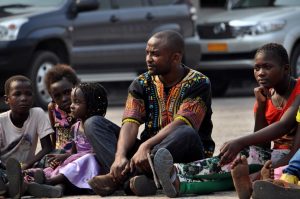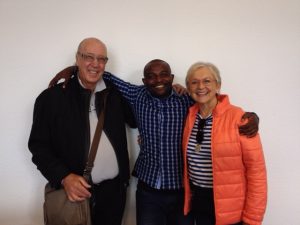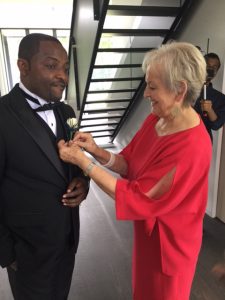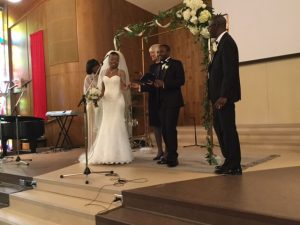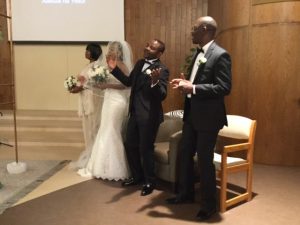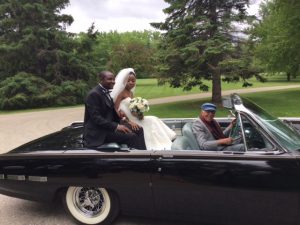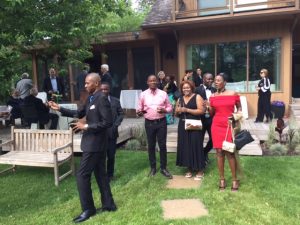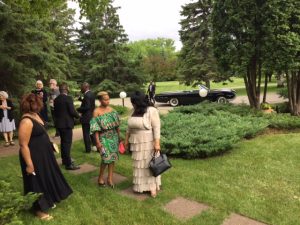Babette’s Feast 2.0
The menu was delicacies prepared by a chef from Sierra Leone and the guests did not share the dour Danish skepticism of the original movie – but the story line is equally intriguing.
On June 16, 2017 Babette Kini was married to Junior Nzita Nsuami (see my earlier blog #25 titled “Meet Junior”). The wedding took place on our property in Winnipeg – a property we share with our daughter Tara and her family.
Junior – now age 32 – was captured in the eastern Congo at the age of 12 and forced to be a child soldier until the age of 22. His survival in that environment for so many years is itself a miracle – more miraculous is the fact that he survived with an incredibly positive and forgiving spirit. He has been named Global Ambassador for child soldiers by the UN Secretary-General Ban-Ki-Moon and speaks globally on that subject. He has addressed many Governments and the Security Council of the UN. Recent political events in the Congo with the unfortunately typical problem of a President not stepping down at the end of his term compromised Junior to the point that friendly governments helped him escape. In that process we have assisted him to find political asylum in Canada.
Babette is from Kinshasa and met Junior in the marketplace some years ago. Politics and lifestyle made marriage difficult. Babette applied for and won the unique diversity lottery in the USA – a bizarre part of the US immigration system. This gives her a green card and a pathway to citizenship. She is studying toward a Nursing Degree in Boston.
They have more or less adopted Leona and myself as unofficial parents and asked if their official wedding could take place on our property. With the help of Tara, various friends and an unexpectedly available and competent Congolese diaspora we collectively created a memorable event for these children of a beautiful but tragic country. It was also a memorable event for the rest of us!
Junior and Babette advised that an engagement ceremony had already taken place in the Congo between relatives or representatives of the two families – and that represented possibly the most important element of a Congolese marriage. Since politics did not allow either Junior or Babette to be in the Congo for that occasion this would represent a traditional Christian wedding to complete the formalities.
The wedding event would be Canadian but flavored with Congolese features and enthusiasm. The marriage ceremony took place in the Mennonite church we attend. The pastor of our congregation was formerly a missionary in the Congo and besides her cultural sensitivity could perform the ceremony in both English and French. The pianist was a Canadian born in the Congo and lived there till age 14. Music was organized by Magalie a delightful Congolese who arrived with her two small boys as a refugee – on the same flight as ours. She found enough other Congolese musicians to create a first class band. The words were traditional but the declaration of marriage produced a response of delight seldom if ever heard in our church!
- Collecting the Bride
- When the real Mother cannot be present
- The ceremony
- The wedding party can join in the fun
We were advised that in the Congo transportation would be by horse and carriage – given the distance and traffic we settled for a beautiful antique Thunderbird convertible – a delightful and very satisfactory substitute. The owner and friend personally did the honors of driving as chauffeur.
The reception took place at our home. Although it had been cloudy the sun decided to emerge to bless the event. The video and still photographers swung into high gear – both members of the Congolese diaspora in Winnipeg.
- Arriving in style at the reception
- Kids are always beautiful
The wedding couple then led the 100 meter walk across the lawn to the home of Tara and Peter – the site of the wedding feast. The African chefs produced a magnificent array of dishes with which the Congolese guests would be familiar. Cassava and plantain with appropriate spices were added to the usual Canadian ingredients such as chicken and beef.
Dinner was followed by a dance on the outdoor patio. Another Congolese was the DJ and used Christian rock and rhythmic tunesto stimulate the African movements.
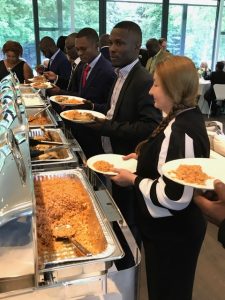
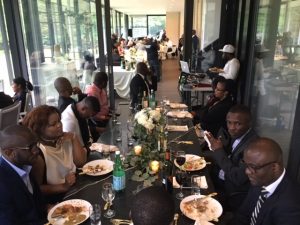 The organization of the wedding across miles and cultures was an interesting experience for all parties as we tried to accommodate other tastes and cultures and as they wanted to be sensitive to their hosts. In the end there were plenty of surprises- most of them pleasant!
The organization of the wedding across miles and cultures was an interesting experience for all parties as we tried to accommodate other tastes and cultures and as they wanted to be sensitive to their hosts. In the end there were plenty of surprises- most of them pleasant!
The biggest surprise based at least partially on cultural adaptation was the role of GPS. A group of Congolese guests from Ottawa very reasonably relied on GPS to make the journey. They had a major surprise when they crossed the bridge to Detroit and found themselves in the hands of confused American border officials. After some multi-lingual discussion they were able to return to Canada and take the long way across the Canadian Shield to Winnipeg. GPS shortest route seems to ignore simple things like international borders! All ended well and they arrived in time for the ceremony.
The departure of our Congolese guests the day after the wedding was a memorable experience. Seemingly without organization they formed a circle and quietly began to sing a prayer of thanks and protection. It was a beautiful and meaningful end to a very special experience.

 Virtually all of the three dozen Congolese guests have a history of displacement and refugee uncertainty. They are determined to make a new life in Canada yet most of them retain linkages back to Africa to assist with those whose futures are more uncertain.
Virtually all of the three dozen Congolese guests have a history of displacement and refugee uncertainty. They are determined to make a new life in Canada yet most of them retain linkages back to Africa to assist with those whose futures are more uncertain.
We were impressed with their intelligence, competence, perseverance and enjoyed their enthusiasm for life and celebration.
We trust the memory of their wedding will be a foundation for the relationship between two wonderful young people – Babette and Junior.
Footnote: The Congo or DRC remains plagued by conflict. Not a single invited guest from the Congo was able to obtain a Canadian visa to attend the event. The presumed fear is that they may claim refugee asylum when they arrive in Canada – a claim that may well be justified. That is the reality of our time


